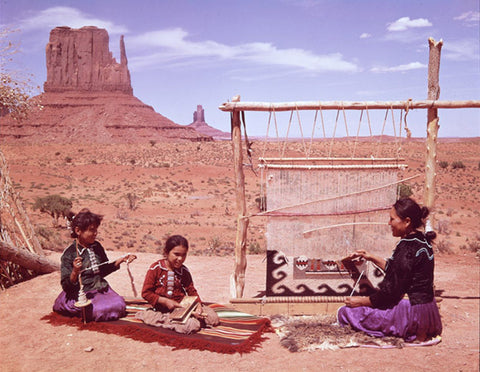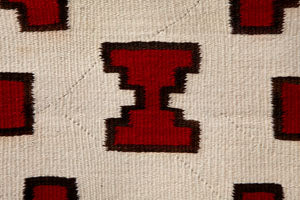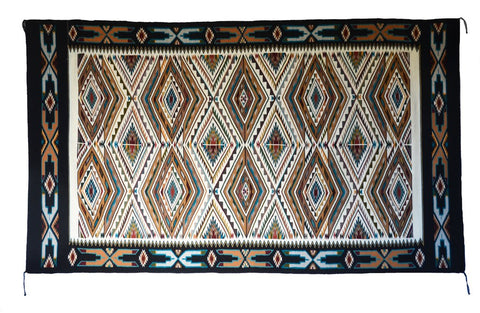Don't Fall for a Knock Off Navajo Rug!

Oh, the thrill of stumbling across a beautiful weaving at a spectacular price. Here at Nizhoni Ranch some of our clients have interesting stories about coming across an estate sale, consignment shop, garage sale or auction house where they hit the jackpot or crapped out.
Yet, the old adage "if something sounds to good to be true, it probably is". Probably is the downfall for some. The definition of probably is: without much doubt, reasonably true, likely. Probably is trouble - it gives a ray of hope to those who want to believe.
Then there is the Antique Roadshow situation. As AR passed through Tucson in 2001 a man took in a blanket he inherited from his grandmother. The blanket was originally given to his great grandfather by Kit Carson. The blanket was used on his bed as a child then later sat on the back of a chair for years. After watching the appraiser almost pass out and then being whisked away by security, he was told the weaving was a Ute First Phase Blanket, circa 1850's. A national treasure worth (at that time) $350k to $500k. Today that very weaving is valued somewhere around 1.5 million. A beautiful story that remains one of AR's finest moments - a must see and a tear jerker!
So what is one to do? Pay close attention to:
1 - Fringe
Almost all Navajo weavings will not have fringe. There are only 2 exceptions. Textiles woven with Germantown yarn. Fringe is added after the weaving is completed. Take a look:
The other Navajo weaving that has fringe (only on one end) is a Gallup Throw. Gallup throws became a popular and inexpensive tourist souvenirs. They are woven with a cotton warp. Once finished the warp is cut then knotted. A typical contemporary Gallup Throw sells for somewhere between $50 to $100. See below:

Ganado Throw
2. Warp
Warp strings run vertically and made on a continuous loom that contains the actual warp threads. You can check this by running your hand along the side of the rug to feel whether the warp threads run the length of the rug or whether they’ve been cut. In Mexican-made copies, the warp strings run horizontally and threads are cut and then sometimes hidden, making it more difficult to detect.

Navajo woman weaving on an upright loom with vertical warp strings.
3. Lazy Lines
Lazy lines appear as a diagonal line in the weave of the fabric. During the weaving process, the rug maker would move to work on adjacent sections of the warp, resulting in the subtle diagonal lines referred to as lazy lines. Note: not every Navajo weaving has visible lazy lines.

Lazy lines at diagonal angles
4. Cost
Like all Navajo weavings, the values vary based on the age, quality, size, design complexity and condition. A 3 x 5 contemporary weaving, with good design, good condition and nice wool starts around $ 2,000. Below is a contemporary Teec Nos Pos / Red Mesa weaving. Teec Nos Pos is one of the most intricate of designs. This was woven in 2017 by Elsie Begay and measures approximately 5' x 9', $9,000.
The U.S. Department of the Interior, Indian Arts and Crafts Board have published a very informative pamphlet on How to Buy Authentic Navajo (Dine') Weavings. To view the publication go to: https://www.doi.gov/sites/doi.
Bottom line, buy through a reputable source and keep all receipts and other documents. Reputable, meaning they stand behind the weaving and if it's not as portrayed, they will return 100% of what you paid.
If you are fortunate enough to have a weaving pop up outside of a gallery or reputable dealer and told it is Navajo, buyer beware. We believe if you love a weaving, the price is right and will still be happy if the weavings turns out to be something other than Navajo - go for it!
Happy Hunting!
- Beth Barth








